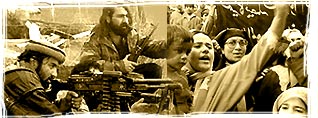The Rediff Special/ Anil Athale


Kashmir is finally being 'Talebanised'. The recent directive by the militants has sent Kashmiri women scurrying to the nearest tailor to buy a burqa. It will be interesting to see how this will apply to the villages. Like in many other places, the women in Kashmir's villages work on farms, planting paddy and plucking saffron or apples!
This is 'Nizam-e-Mustafa' for you, made popular by the BBC clip on Kashmir that showed hysterical old women shouting, "Hame kya chahiye (What do we want)? Nizam-e-Mustafa!" The BBC must have run this clip a zillion times to drive home the point that Kashmiris do not want to be part of India.
A media war against the pluralist, multi-religious, multi-linguistic and multi-racial India has been the ex-imperialists' staple diet for a long time. Now, media warfare is part and parcel of modern life in the first century of the new millenium!
Publicity is like oxygen for the terrorists. Without the media, they cannot claim credit for their actions. The publicity attending their violence gives their cause visibility and also helps them in extortion by creating a climate of fear.
The British, who have faced the terror tactics of the Irish Republican Army for several years, have come to the conclusion that terrorists must be denied publicity. Hence, under the Emergency Provisions Act of 1991, they imposed a total ban on the publication, broadcast or telecast of any statements by or interviews with terrorist organisations.
The glamourisation of criminals
In the 1970s, I was on leave from Kashmir and decided to indulge myself by going for dinner to a 'swank' restaurant. As I settled down, there was a flurry of activity: the steward rushed to welcome the guest and waiters fawned over the table where he settled down. As a waiter approached me, I asked him who the commotion-causing 'star' was! In hushed, respectful tones, the waiter confided, "Saheb, bahut bada smuggler hai woh (Sir, he is a big-time smuggler)!"
It was only a matter of time before Bollywood jumped on the bandwagon and we saw the spectacle of a star, the famous Big B (Amitabh Bachchan) in many of his films sweeping all before him. Violence in society exists, but the media 'glamourised' it. The fact that smugglers played a major role in this kind of promotion is now an open secret. Since most of these movies were funded by the underworld, it was to be expected that they would dictate the storyline.
Thanks to the spread of television, the potential for mischief is much greater today.
In the 1990s and the 21st century, the terrorist/militant seems to have replaced the smuggler as the object of glamour and commercialisation. Some years ago, an Indian Army brigadier's son left home to join some militants in the jungle. Subsequent enquiries revealed that peer pressure and the glamour associated with the life of a rebel were largely responsible for his action. Recent news from Kashmir speaks of militants being sought after as bridegrooms by educated Kashmiri women, professionals like doctors, lawyers, etc.
When I was in Doda district a year ago, I was aghast to learn that the father of a known terrorist (the one who had massacred 25 members of a marriage party) was a respected village elder. What message does that give to a would-be militant?
The family of a terrorist should not be punished for the deeds of their kin. But when they enjoy social prestige because of their acts, it is time to think if the supporters of terrorism should be permitted to abuse the freedom they help sabotage!
Why can't we follow Britain's example and impose similar curbs on the misuse of the media? The ban on reporting the views and opinions of terrorists does not mean media censorship, for they are free to report incidents and facts; one is only seeking to stop propaganda. Once deprived of the media exposure, the incentive to indulge in violence is automatically reduced.
Terrorists follow no rules and deserve no freedom of expression for they believe in speaking through guns. Of course, the usual human rights groups would make a lot of noise if this were done, but their deafening silence over the outrage by the militants has shown them to be cowards. (This was clearly seen in Punjab during the bloody eighties)!
There is a possibility that the foreign media, especially television, may not accept this restriction. But if any channel wants to defy India's diktat, we should make sure they lose their business in India.
India does not have an organisation to deal with psychological warfare; what we have instead is a group of amateur military and civil bureaucrats playing 'mandarins'. The Vietnam war was not lost on the battlefield, where the US Army remained undefeated. It was lost by Americans in drawing rooms across the US. Unless India wakes up and realises the importance of media warfare, we may have to pay a very heavy price.
Page design: Lynette Menezes
The Rediff Specials